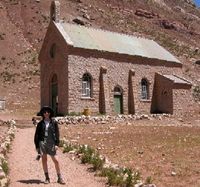We're a rum lot, we Rutabegas*
I was off work this week, and among other things I went to the Klondike Gold Rush National Historic Park with my friend Monica. It was quite interesting, actually, and I got to chatting with the park ranger, and explained that I have ancestors and relatives who tromped around up there in the Northwest Territories, and our family even has a river and a mountain and a lake and various other things named after us. (All names will be changed, not so much to protect the innocent as to prevent people searching the Internet for my illustrious ancestors from stumbling upon this blog and discovering how very un-illustriously their gene pool has mutated.)
Anyway, the ranger asked a simple question which stopped me short and got me going on one of my cute, obsessive little research benders: "What were they doing up there?"
Here is the basic story, as I can piece it together from family and the all-knowing Internet: In the early 1800s, a woman in England got knocked up, and she and her beau got hitched right quick and went to Ceylon, where little Julius Rutabega was born. Julius later turns up in Canada joining the military in his teens, and then joins up with the Hudson's Bay Company, like so many adventurous men before him. In 1869, Julius marries a nice girl named Sarah, and they proceed to have 11 children while living up in the god-forsaken unspeakably cold wildnerness of the far, far, FAR north. That's right ELEVEN children. Nine of whom survive, no less.
Now for some reason, Julius is no longer using the esteemed Rutabega name, but rather has adopted his mother's maiden name, Camel. His wife goes by Camel, his children do too. In 1876, Julius takes a two-year leave of absence from his job, leaves Far North, and travels by dogsled, snowshoe, train and steamer back to England and legally changes his name from Rutabega to Camel. Why? Why did he suddenly do this, at the age of 40?
One of Julius and Sarah's many children went on to become a famous scientist and government official, with many things named after him in Canada. This golden child happened to be born in 1876, the year Julius set out on his mysterious trip to England. Did Julius sense greatness in his new son, and decide then and there that he had to make the name change legal? What was wrong with the name Rutabega, anyway - did it just sound silly, or did Julius have Daddy Issues? Did something else take Julius to England that year, and the legal name change was just some extra housekeeping he took care of while he had the chance? Why couldn't he change his name in Canada? Were they sticklers about these kind of legalities on the Canadian frontier? Would the poor Canadians eventually have been stuck with Lake Rutabega instead of Lake Camel, had Julius not braved all of Alberta and Saskatchewan by snowshoe that year?
I find this story fascinating, and it gives me insight into how people become obsessed with researching their genealogy - and let me tell you, having ventured out into the Internet, there are some obsessed folk out there. I don't intend to become one, but I really do want to know: Why did Julius Rutabega travel to England and come back Julius Camel?
One other interesting note: It turns out the spunky and fertile Sarah - who lived to be 90 years old - was half Native Canadian. Given that in fact this branch of my lineage is moderately famous - and also officially claimed their First Nation membership at that time - it would probably be possible for me to register as a member. Which I would never do, since I do not culturally self-identify as a Native Canadian from the far north, but Enrico did point out to me that I may have the option not just of a back-up country, but a whole back-up race.
I should clarify that I am not descended from the famous son of the Rutabega/Camel clan, but from one of his numerous siblings. I won't say which one, except that it's not the one who drowned crossing the Great Slave Lake by dogsled.
And, in answer to the nice park ranger's question: My people just chose to live up there, because they loved the country, and that's where they found fame and fortune, and it's where at least some of their people had lived before any Europeans even arrived. Rumor has it that a few of those plucky Rutabega boys did hotfoot it over to the Klondike to search for gold for a while. But being native to the area, they figured out pretty quickly that it was a miserable, miserable proposition.
*A little joke for you Cold Comfort fans.

2 comments:
What?? How did you learn all this? Do we have Native American blood in us? This is all very enlightening.
The power of the Internet, my dear. And yes, it appears we are each 1/32nd Native Canadian. And believe me, there's more - this would make the great basis for an historical romance novel. Let's tawk, my dear!
Post a Comment